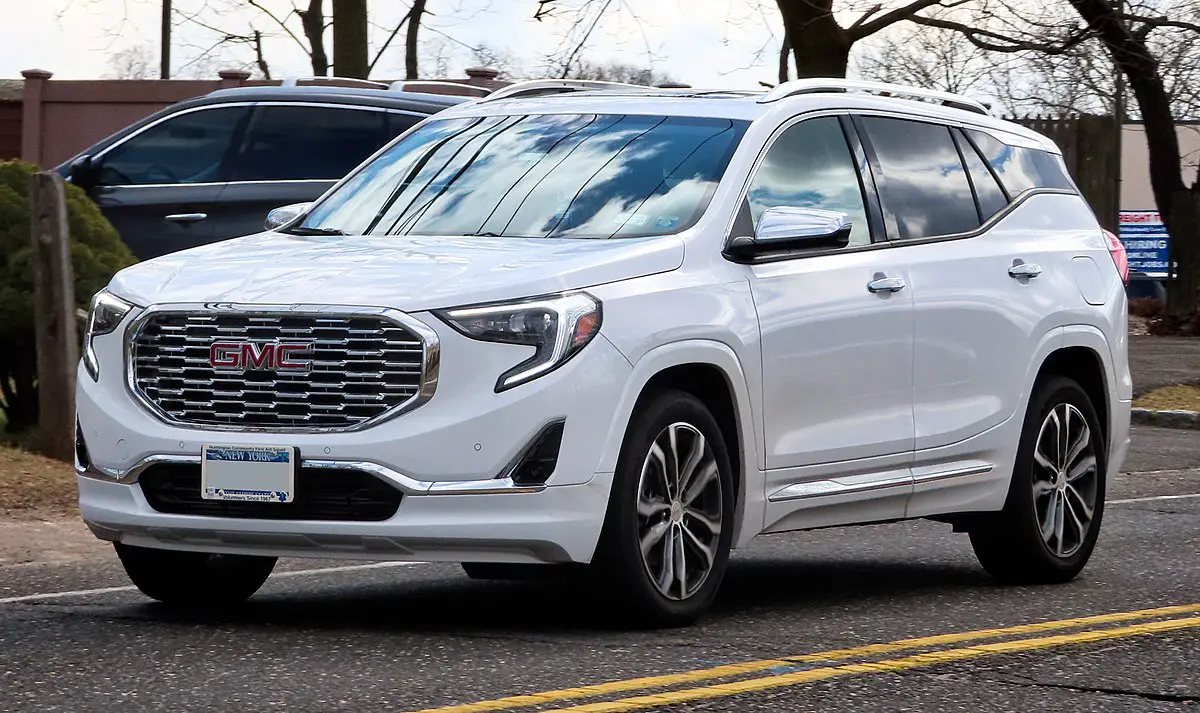If you are looking for a compact SUV that can serve as a perfect family car, you might be interested in the GMC Terrain.
This model has been in production since 2010 and has a distinctive styling and interior.
However, before you decide to buy one, you should be aware of some of the common problems that affect the 2011 model year.
In this article, we will give you a complete guide on the GMC Terrain 2011 problems, such as excessive oil consumption, transmission failure, and cooling system leaks.
We will also provide you with some tips on how to avoid or fix these issues.
By the end of this article, you will have a better understanding of the pros and cons of owning a GMC Terrain 2011.
How to Check and Prevent Excessive Oil Consumption in Your GMC Terrain 2011?
One of the common problems of the GMC Terrain 2011 is excessive oil consumption. This means that the engine uses more oil than normal, which can lead to various issues such as engine shutdown, power loss, spark plug damage, and engine misfire. In this section, we will explain how to check and prevent excessive oil consumption in your GMC Terrain 2011.
1: How to check excessive oil consumption
The first step is to check the oil level in your engine using the dipstick. You can do this by following these steps:
- Let the engine warm up, turn it off, and let it sit for a few minutes so the oil can collect at the bottom of the oil pan.
- Remove the dipstick, clean it with a rag, and reinsert it fully.
- Remove the dipstick again and check the oil level. It should be between the minimum and maximum marks on the dipstick. If it is below the minimum mark, you need to add more oil.
- Repeat this process every time you fill up your gas tank or every 1,000 miles, whichever comes first. If you notice that your oil level drops significantly between checks, you may have excessive oil consumption.
2: How to prevent excessive oil consumption
The main cause of excessive oil consumption in the GMC Terrain 2011 is a defective piston design in the 2.4L engines. The piston rings, which are supposed to seal the oil in the cylinder, fail to do so and allow oil to leak into the combustion chamber. This oil is then burned off or forms carbon deposits in the engine. To prevent this, you need to do the following:
- Update the engine control module (ECM) calibration. The ECM is the computer that controls the engine functions. GMC has released several technical service bulletins (TSBs) to update the ECM calibration and adjust the oil life monitor to 7,500 miles. This can help reduce the oil consumption and improve the engine performance. You can take your vehicle to a GMC dealer or a certified mechanic to perform this update
- Perform an oil consumption test. This test helps determine the condition of the piston rings and the amount of oil consumed by the engine.
You can do this test by following these steps:
- Confirm that the ECM has the latest TIS2Web Calibration.
- Change the engine oil and filter, and reset the oil life monitor.
- Drive the vehicle for at least 2,000 miles under normal conditions.
- Check the oil level and record the amount of oil added, if any.
- Repeat steps 3 and 4 until the oil life monitor reaches 10% or less.
- Calculate the average oil consumption per 1,000 miles by dividing the total amount of oil added by the total number of miles driven.
- Compare the result with the acceptable oil consumption rate of 0.946 liters (1 quart) per 3,200 km (2,000 miles). If the result is higher than this rate, you may have a problem with the piston rings.
3: Replace the piston rings and/or the pistons
If the oil consumption test indicates that the piston rings are defective, you need to replace them with new ones.
In some cases, you may also need to replace the pistons, which are the parts that move up and down in the cylinder.
This is a major repair that requires disassembling the engine and replacing the parts. You can take your vehicle to a GMC dealer or a certified mechanic to perform this repair.
GMC has also offered special coverage to vehicles that meet specific conditions relating to oil consumption.
You can check with your dealer if your vehicle is eligible for this coverage.
Important: GMC Theft Deterrent System Reset: How To & Tips
What Causes Transmission Failure in GMC Terrain 2011 and How to Fix It?
There are several possible causes of transmission failure in the GMC Terrain 2011, such as:
-
Low transmission fluid
Transmission fluid is essential for lubricating the transmission parts and maintaining the proper pressure for smooth gear engagement. If the fluid level is too low, the transmission can overheat, slip, or fail. Low fluid levels can be caused by leaks, poor maintenance, or incorrect fluid type.
-
Faulty transmission control module (TCM)
The TCM is the computer that controls the transmission functions, such as shifting gears, torque converter lockup, and adaptive learning. If the TCM is defective, it can send wrong signals to the transmission, causing it to malfunction or fail. A faulty TCM can be caused by electrical issues, water damage, or software glitches.
-
Worn-out clutch or pressure plate
The clutch and the pressure plate are the parts that connect and disconnect the engine and the transmission. They allow the transmission to shift gears smoothly and efficiently. If the clutch or the pressure plate is worn out, it can cause the transmission to slip, shudder, or fail. Worn-out clutch or pressure plate can be caused by excessive wear and tear, improper driving habits, or poor quality parts.
-
Debris or contamination
Debris or contamination can clog the transmission filter, valve body, or solenoids, which are the parts that regulate the fluid flow and pressure in the transmission. This can cause the transmission to lose pressure, overheat, or fail. Debris or contamination can be caused by metal shavings, dirt, water, or incorrect fluid type.
How to Deal with Cooling System Leak in GMC Terrain 2011?
A cooling system leak in your GMC Terrain 2011 can cause your engine to overheat and damage other components.
It is important to deal with it as soon as possible.
Here are some steps to help you fix a cooling system leak in your GMC Terrain 2011:
-
Identify the source of the leak
You can do this by checking for signs of coolant on the ground, under the hood, or on the hoses and radiator. You can also use a pressure tester to find the leak more easily.
-
Repair or replace the leaking part
Depending on the location and severity of the leak, you may need to tighten a hose clamp, patch a hole, replace a hose, or replace the radiator. You can use a repair kit or a sealant product to temporarily fix minor leaks, but they are not a permanent solution.
-
Refill the coolant
After fixing the leak, you need to refill the coolant reservoir with the proper type and amount of coolant. You can use a 50/50 mix of water and antifreeze, or a pre-mixed coolant. You should also bleed the air from the cooling system to prevent air pockets and overheating.
-
Monitor the coolant level and temperature
After refilling the coolant, you should check the coolant level regularly and look for any signs of leakage. You should also keep an eye on the engine temperature gauge and make sure it does not go above the normal range.
What problems does the 2011 GMC Terrain have?
The 2011 GMC Terrain is a compact SUV that has some common problems, such as:
-
Excessive oil consumption
The engine may use more oil than normal, which can cause engine shutdown, power loss, spark plug damage, and engine misfire. This is mainly due to a defective piston design in the 2.4L engines.
-
Transmission failure
The transmission may stop working properly or completely, which can make the vehicle inoperable. This is mainly due to low transmission fluid, faulty transmission control module, worn-out clutch or pressure plate, or debris or contamination.
-
Cooling system leak
The cooling system may leak coolant, which can cause the engine to overheat and damage other components. This is mainly due to leaks, poor maintenance, or incorrect coolant type.
How to Maintain Your GMC Terrain 2011 and Extend Its Lifespan?

Maintaining your GMC Terrain 2011 and extending its lifespan is important for your vehicle’s performance, safety, and value. Here are some detailed steps to help you take care of your GMC Terrain 2011:
-
Follow the manufacturer-recommended maintenance schedule
This schedule tells you when to perform routine services such as oil changes, tire rotations, fluid exchanges, filter changes, brake inspections, and tune-ups. These services help keep your engine, transmission, suspension, steering, and brakes in good condition and prevent common problems. You can find the maintenance schedule for your GMC Terrain 2011 in your owner’s manual or online.
-
Check the oil level and condition regularly
Oil is essential for lubricating the engine parts and preventing excessive wear and tear. You should check the oil level and condition every time you fill up your gas tank or every 1,000 miles, whichever comes first. You can do this by using the dipstick under the hood. The oil level should be between the minimum and maximum marks on the dipstick. The oil color and smell should be red or pink and sweet. If the oil level is low, you need to add more oil. If the oil color is brown or black and has a burnt smell, you need to change the oil and the filter.
-
Check the tire pressure and condition regularly
Tire pressure affects your vehicle’s handling, traction, fuel economy, and tire wear. You should check the tire pressure at least once a month or before a long trip. You can do this by using a tire pressure gauge or the tire pressure monitoring system (TPMS) in your vehicle. The tire pressure should match the recommended level on the driver’s door jamb or in your owner’s manual. If the tire pressure is low, you need to inflate the tires. If the tire pressure is high, you need to deflate the tires. You should also inspect the tire tread and look for any signs of damage, such as cracks, bulges, or punctures. If the tire tread is worn below 2/32 of an inch, you need to replace the tires.
-
Check the coolant level and condition regularly
Coolant is essential for cooling the engine and preventing overheating. You should check the coolant level and condition every time you change the oil or every 3,000 miles, whichever comes first. You can do this by looking at the coolant reservoir under the hood. The coolant level should be between the minimum and maximum marks on the reservoir. The coolant color and smell should be green or orange and sweet. If the coolant level is low, you need to add more coolant. If the coolant color is brown or rusty and has a sour smell, you need to change the coolant and the filter.
-
Check the battery condition and charge level regularly
The battery is essential for starting the engine and powering the electrical components. You should check the battery condition and charge level every time you change the oil or every 3,000 miles, whichever comes first. You can do this by using a battery tester or the battery indicator light in your vehicle. The battery condition should be good and free of corrosion, leaks, or cracks. The battery charge level should be above 12.6 volts. If the battery condition is poor, you need to clean or replace the battery. If the battery charge level is low, you need to recharge the battery or check the alternator.
Important: 2015 GMC Yukon Transmission Problems: How To Diagnose & Fix Them!
-
Drive smoothly and avoid heavy braking
Driving smoothly and avoiding heavy braking can help reduce the stress on your engine, transmission, and brakes. You should accelerate and decelerate gradually, maintain a steady speed, and avoid sudden stops. You should also use the cruise control and the overdrive features when appropriate. These driving habits can help improve your fuel economy, reduce your emissions, and extend the life of your vehicle.
What are the disadvantages of a GMC Terrain?
The GMC Terrain is a compact SUV that has some advantages, such as a spacious interior, a smooth ride, and advanced safety features. However, it also has some disadvantages, such as:
-
Limited engine options
The Terrain only offers two turbocharged four-cylinder engines, which may not satisfy some buyers who prefer more power or fuel efficiency choices. The base 1.5-liter engine is especially weak and unresponsive, making the vehicle sluggish and noisy.
-
Interior quality
While the Terrain provides ample space, the overall interior quality might not match the expectations of some buyers. Some of the materials and finishes are cheap and bland, and the design is outdated and boring. The infotainment system, while user-friendly, is also small and slow compared to some rivals.
-
Lack of agility
The Terrain’s handling and maneuverability may not be as nimble as some other compact SUVs. The steering is vague and light, and the suspension is soft and bouncy. The vehicle feels heavy around corners and in tight spaces. The off-road capability is also limited, despite the availability of an off-road mode.
How long do GMC Terrain engines last?
GMC Terrain engines can last up to 300,000 miles with regular maintenance and proper driving habits. This means that if you drive an average of 15,000 miles per year, your GMC Terrain engine can serve you for about 20 years. However, this also depends on the model year, as some older models may have more problems than newer ones
2011 Gmc Terrain Timing Chain Recall
The 2011 GMC Terrain timing chain recall is a safety issue that affects some vehicles with a 2.4L engine manufactured between 2010 and 2014.
The timing chain is a part of the engine that controls the opening and closing of the valves. It is driven by the crankshaft and made of metal links.
The timing chain is supposed to last for the life of the engine, but in some cases, it can wear out prematurely and cause serious problems.
The main problems caused by the defective timing chain are:
- Premature wear: The timing chain can stretch or break due to excessive friction or lack of lubrication. This can affect the engine’s performance and cause reduced power, rough idle, poor oil level, and misfires. It can also damage the engine’s timing and cause knocking or rattling noises. In some cases, the engine may fail and require a costly replacement.
- Engine noise: The worn-out timing chain can produce loud and unpleasant sounds from the engine compartment. These noises can be heard when starting the engine, idling, or accelerating. They can indicate that the timing chain is loose, misaligned, or not functioning properly. If the noise is ignored, it can lead to further engine damage or failure.
- Reduced performance: The faulty timing chain can affect the engine’s efficiency and reliability. It can cause the engine to run poorly, lose control, or stall unexpectedly. It can also trigger the check engine light or other warning indicators on the dashboard. These issues can compromise the vehicle’s safety and performance and increase the risk of accidents or breakdowns.
The recall was issued by GMC in 2014 to address these problems and prevent potential harm to the drivers and passengers.
The recall covers about 51,000 vehicles in the U.S. and Canada. The affected vehicles include the 2010-2014 GMC Terrain, the 2010-2014 Chevrolet Equinox, the 2011-2013 Buick Regal, and the 2013 Chevrolet Malibu.
The recall instructs the owners to bring their vehicles to a GMC dealer for a free inspection and repair.
The dealer will check the condition of the timing chain and replace it if necessary.
The dealer will also update the engine control module software to improve the timing chain’s durability and performance.
Conclusion
In this article, we have given you a complete guide on the GMC Terrain 2011 problems, such as excessive oil consumption, transmission failure, and cooling system leaks.
We have also explained the causes, effects, and solutions of these problems, and how to maintain your GMC Terrain 2011 and extend its lifespan.
The GMC Terrain 2011 is a compact SUV that has some advantages, but also some disadvantages and common problems that affect its reliability.
Depending on your preferences and needs, you may find these problems to be minor or major, and you may want to consider other alternatives or newer models.
We hope this article has helped you understand the pros and cons of owning a GMC Terrain 2011.




